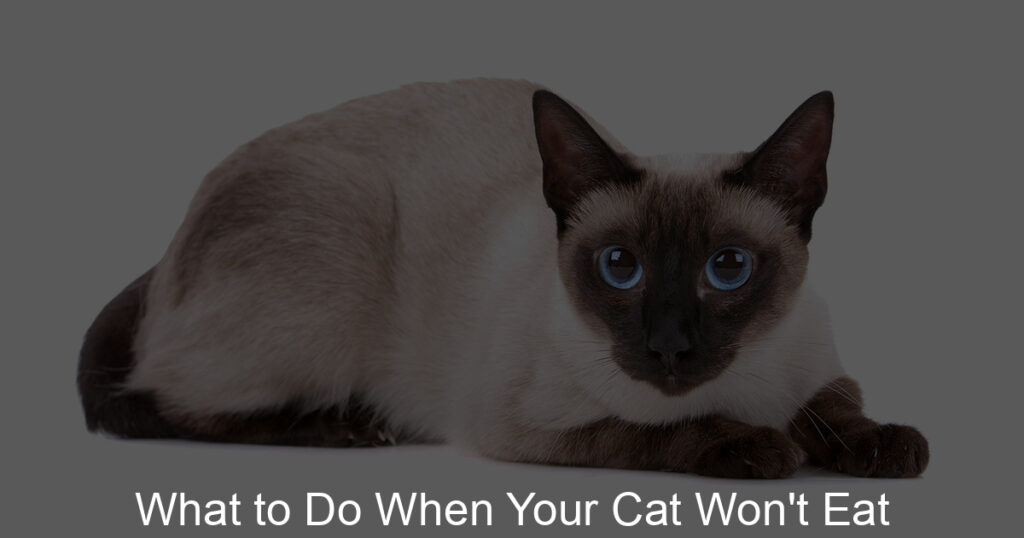Are you worried about why your siamese cat won’t eat? If the usual bowl of kibble and treats aren’t enticing, it might be time to look into other things that could be causing this issue.
It’s important to take note of any changes in appetite and behavior, as these can indicate a medical problem or other cause for concern. In this blog post, we’ll explore some potential causes behind why your feline friend isn’t feeling so hungry these days and discuss strategies for improving their diet.
Read on to find out how you can get your beloved cat back to eating normally!
What do you do when a cat won’t eat?
When a cat won’t eat, it’s important to figure out why. It could be that they don’t like the food you’ve given them, or possibly an upset stomach involving digestive issues or stress.
In these cases, consider offering special treats to stimulate their appetite while consulting with a vet if the issue persists or worsens. For cats who are picky eaters, it helps to offer a variety of flavors and textures and also make sure their food is at room temperature.
Serving two smaller meals per day can also encourage cats to eat more often, as well as make sure their food bowl is clean between meals. With some patience and experimentation, it’s usually possible to find something that works for each cat’s preferences!
When should I worry about my cat not eating?
If you have a concern that your cat is not eating like it used to, it’s best to identify and address the issue right away. While cats usually eat their food at a leisurely pace, any sudden decrease or complete refusal of food can be cause for concern.
Generally speaking, if you observe that your beloved feline companion hasn’t eaten anything in more than 24 hours, even if they are drinking plenty of water, you should contact your vet as soon as possible.
Furthermore, if there are any other signs such as lethargy, vomiting, and diarrhea accompanying the lack of appetite then an urgent visit to your local veterinarian might be wise. In conclusion, if results come back normal from the vet then simply offering them more diversity in meals may help increase their appetite.
How long can a cat go without eating?
Cats are hardy creatures that can go without food longer than almost any other pet. A normal, healthy adult cat can usually go up to two weeks without eating before they start suffering any ill effects.
That said, of course, cats will be getting more and more hungry in the intervening days, and it’s important to remember that cats need a balanced diet to stay healthy. Along with not eating for an extended period, cats shouldn’t be skipping meals or eating the wrong kinds of food since those could cause serious long-term issues with their health.
How can I get my cat to eat again?
If your cat has stopped eating, it could be a sign that something is amiss. Many cats are picky eaters, but the sudden refusal of food can mean that an underlying issue needs to be addressed.
Make sure to rule out any health issues by consulting with your vet. Vets can help determine if there’s another medical reason why your cat isn’t eating.
If nothing serious is wrong, consider making some changes in her diet – try different types of wet food and some treats as well. Don’t just leave her bowl long-term, mix things up and give her something to look forward to when it comes to mealtime.
Playing with her over dinner might make things more interesting or rewarding too depending on her preferences. It may take some trial and error but you should soon find the right solution that will get your beloved feline chowing down again!
What do you feed a cat that refuses to eat?
Dealing with a picky eater can be tough, especially when it comes to cats who, let’s face it, are typically finicky. It can be especially challenging if your cat refuses to eat altogether.
In this situation, you should probably consult your veterinarian to make sure your cat isn’t struggling with any underlying health issues that may be causing the lack of appetite. Once you’ve ruled out any medical concerns, it’s important to find nutritious food that appeals to the tastes of your pet.
Homemade cooked meals are often a great option as they tend to have much more enticing aromas than store-bought food. You might also experiment with different flavors and textures or try warming up their food before serving it.
And don’t forget about treats! One trick is to save them for mealtime so the kitty will associate them with being rewarded for eating. With a little bit of trial and error, hopefully, you’ll work together to get the kitty back on track in terms of healthy nourishment.
Should I force-feed my cat?
Figuring out whether or not to force-feed your cat can be a difficult decision to make. Both you and your cat’s well-being must be taken into consideration when deciding on this course of action.
Ultimately, if it is determined that force-feeding is necessary for your cat’s health, it should be done with the utmost care and compassion. With some extra patience, love, and proper guidance from a veterinarian, you can help nurture your beloved pet back to its full strength without putting them under undue stress.
When should I worry if my cat stops eating?
If your cat is not eating anything for more than 24 hours, you may start to worry. In cats, anorexia is a serious symptom that can signify a wide range of underlying health problems, ranging from dental issues to organ failure and even cancer.
Moreover, cats are obligate carnivores so they need some protein in their diet to sustain themselves. If your cat hasn’t eaten anything for more than 48 hours and doesn’t show any interest in food, consult your vet as soon as possible.
Do not take any risks like offering human food or supplements without consulting an expert as it may even worsen the situation.
How do you comfort a sick cat?
Looking after a sick cat can be difficult and heartbreaking, but comforting your feline friend is essential to helping them recover. Make sure your sick cat has a warm, quiet space to curl up and rest; cats often enjoy being in enclosed places like boxes, so you could always look there for advice on appropriate bedding, or even make them a cozy fort out of furniture.
Additionally, give your pet plenty of attention while they’re ill; talk to them soothingly and let them know you love them. If possible, something as simple as providing extra warmth with heating pads can make a huge difference for an ailing cat.
Finally, don’t forget that vet visits are necessary; keep up with regular appointments so that your pet is always well taken care of.
Will my cat eventually eat?
It’s natural to worry when your cat goes off its food for a few days. That said, cats are complex animals and some can be quite choosy about their diets!
Most of the time, if your cat isn’t eating there is likely an underlying medical issue so it’s always best to take them to the vet for a check-up. An easily identifiable cause could be stress from recent changes in their environment, or even being loved too much!
If there’s no medical reason then don’t worry too much – a few treats or new toys might perk up your cat’s appetite again in no time!
Do cats go through phases of not eating?
It’s not uncommon for cats to go through periods where they are picky eaters or even stop eating altogether. While cats may have a more finicky appetite than other animals, it is also typical behavior for them as they go through phases of diva-like tendencies and demands.
Just like humans, cats are creatures of habit and tend to stick to certain routines and preferences when it comes to food, so if there’s a sudden change in their eating habits it could be due to several factors. Whether your cat suddenly turned its nose up at its kibble or stopped eating altogether, the most important thing you can do is observe what’s going on and make sure it doesn’t become an ongoing problem.
Wrapping Up
It is always crucial to pay close attention to your pet’s eating habits and make sure they are getting the nutrition they need. With cats, it is even more vital since cats can be picky eaters, and decreasing appetite could be a sign of an underlying health issue.
Remember to keep track of any mood changes, eating habits, and stool consistency as these are all important indicators that something may be wrong. Try some of the strategies discussed so far or consult your vet if you see any concerning behaviors which could require a professional veterinary response and diagnosis.
Ultimately, with proper care and monitoring, you will be able to identify and satisfy the needs of your beloved feline family member!








